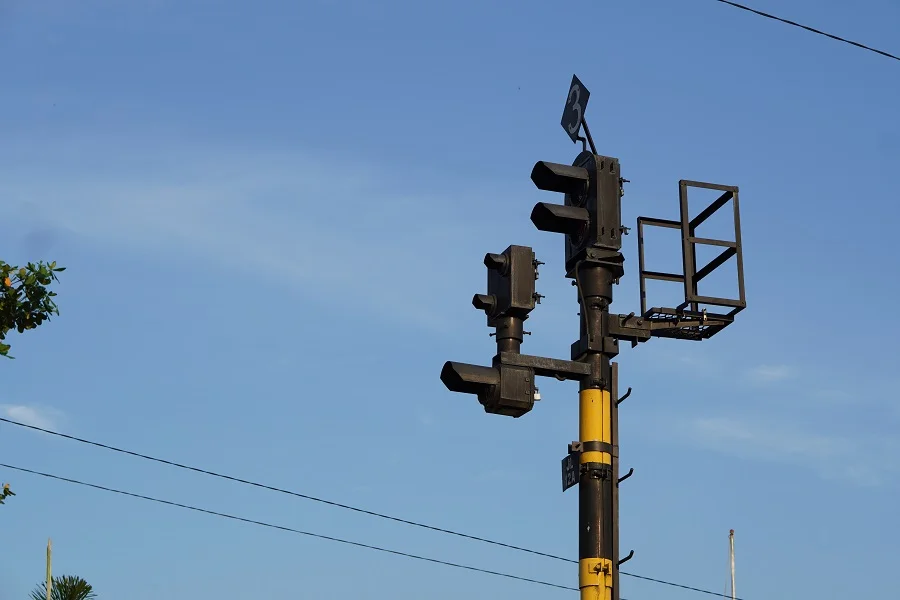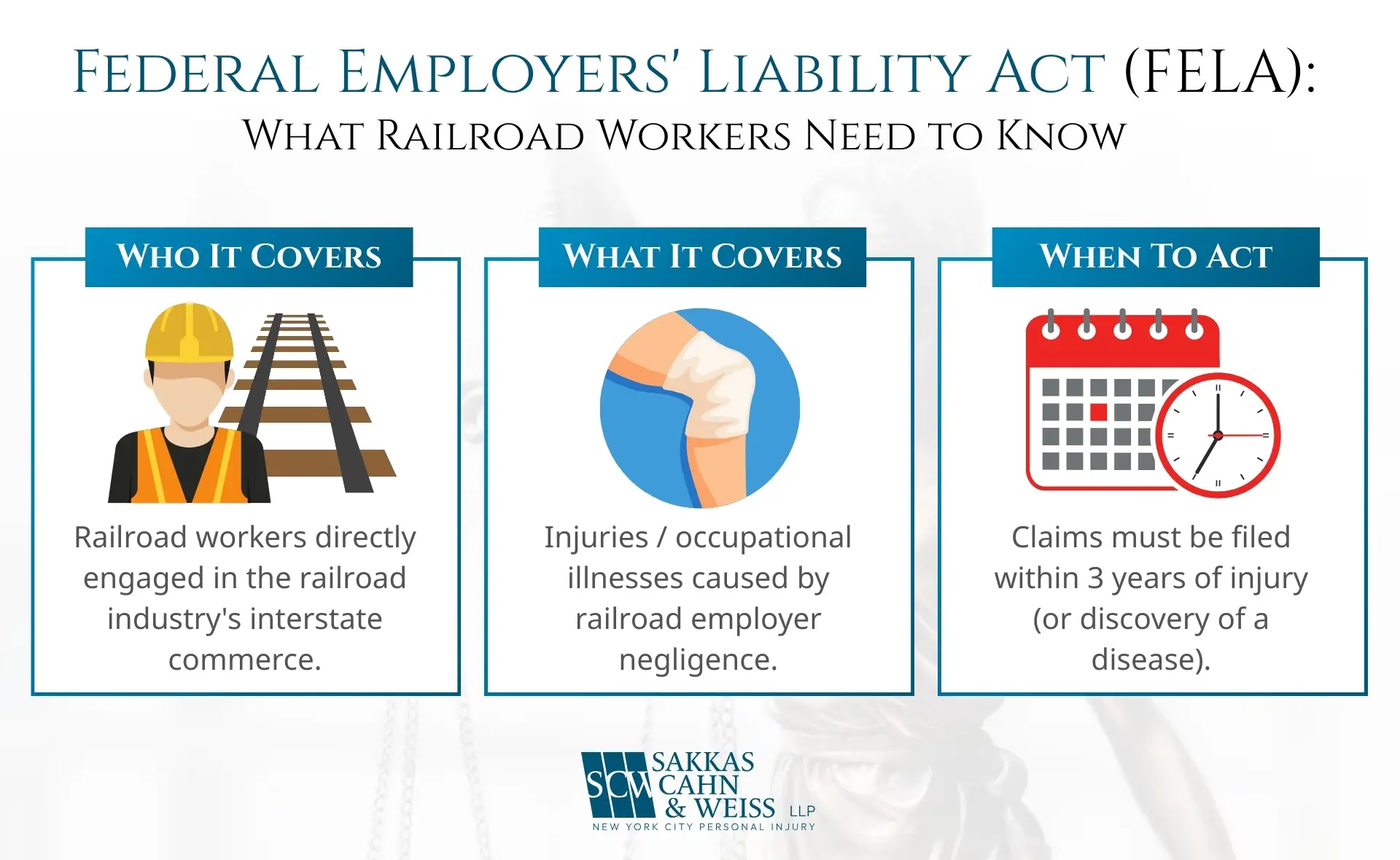The railroad industry and railway workers hold a special position in our national workforce. They have long been considered the backbone of the nation. Railroad work demands physical endurance and split-second decisions, but when accidents strike, injured workers discover they operate under different rules than most employees. The Federal Employers' Liability Act (FELA) provides the primary legal framework for railroad workers hurt while performing their duties.
At Sakkas, Cahn & Weiss, our New York City FELA attorneys have spent decades securing full compensation for railroad employees who've suffered workplace injuries.
Let's examine how this federal law functions and what injured railroad workers should do to protect their interests.
Federal Employers' Liability Act (FELA) Explained
The Federal Employers' Liability Act operates as the sole remedy for railroad workers injured during employment, replacing traditional workers' compensation systems with a fault-based structure. This federal law, passed in 1908 during the height of railroad expansion, acknowledges the inherent dangers of railroad operations and grants injured railroad workers a legal avenue to recover compensation when employer negligence contributes to their harm.
Who Falls Under FELA Protection?
FELA's coverage extends to workers directly engaged in the railroad industry's interstate commerce activities. The law protects employees of interstate railroad companies, from major carriers like Amtrak, CSX, and Norfolk Southern to regional lines like Metro-North and Long Island Rail Road. This encompasses engineers piloting locomotives, conductors managing train operations, brakemen controlling speed, switchmen directing rail traffic, and maintenance crews keeping equipment operational.
Signal maintainers ensuring safe communications, track inspectors monitoring rail conditions, and administrative staff supporting railroad operations also receive FELA protection when their duties relate to transportation activities. Contract workers performing services that further the railroad's interstate commerce mission may qualify for FELA benefits, regardless of direct employment status.
The determining factor isn't job classification but whether the employee's work advances the railroad's transportation functions across state lines.
Workplace Accidents Covered by FELA

Railroad employees encounter numerous hazards throughout their shifts, and FELA covers injuries stemming from various workplace incidents:
- Collisions between trains or with vehicles at crossings.
- Falls from moving equipment during coupling operations.
- Malfunctions of locomotives, air brakes, or switching mechanisms.
- Chemical exposure from diesel exhaust, solvents, or herbicides.
- Cumulative trauma from repetitive lifting, pulling, and climbing.
- Electrical injuries from catenary systems or third-rail contact.
- Crushing incidents during car movements in rail yards.
- Slip-and-fall accidents on ballast, platforms, or equipment.
- Fatal accidents where a personal representative can pursue wrongful death claims.
The Federal Employers' Liability Act also encompasses occupational illnesses developing gradually through workplace exposures, including respiratory conditions from diesel fumes, hearing impairment from locomotive noise, and musculoskeletal disorders from years of physical labor.
How FELA Differs from Workers' Compensation
Traditional workers' compensation programs provide benefits without requiring fault determinations, but FELA mandates that injured workers demonstrate employer negligence contributed to their injuries. This distinction shapes every aspect of pursuing compensation.
Workers' compensation delivers preset benefit schedules based on injury classifications and wage calculations. FELA cases permit injured railroad workers to pursue full compensation encompassing all losses, including pain and suffering damages unavailable through workers' compensation. While state administrative boards handle workers' compensation matters, FELA cases proceed through federal court systems or state courts applying federal law.
Proof requirements diverge substantially between these systems. Workers' compensation requires only evidence linking injuries to workplace activities, whereas FELA demands proof that the railroad employer's actions or omissions played a role in causing harm.

What to Do After a Railroad Workplace Accident
Your response following a railroad injury significantly influences your ability to secure compensation under the Federal Employers' Liability Act:
- Report immediately to supervisors: Document the incident in company records and obtain copies of all reports filed. Insist on accurate descriptions of how injuries occurred.
- Get medical treatment promptly: Seek care for all injuries, including those that initially seem minor. Inform healthcare providers about workplace causation and describe all symptoms.
- Create thorough documentation: Photograph accident scenes, damaged equipment, and injury sites. Record witness information and their observations of unsafe conditions.
- Preserve physical evidence: Retain torn uniforms, broken safety gear, and other tangible proof. Railroad companies may dispose of evidence supporting your claim.
- Decline recorded statements: Claim representatives often seek admissions limiting railroad liability. Politely refuse interviews until consulting legal counsel.
- Engage an attorney quickly: FELA cases involve intricate legal standards and sophisticated defense strategies. Early representation protects against mistakes jeopardizing recovery.
Filing Deadlines for FELA Claims in New York
The Federal Employers' Liability Act establishes a three-year statute of limitations for bringing injury claims. This period begins on the injury date or, for occupational diseases, when the railroad employee discovered or reasonably should have discovered the condition's work-related nature.
Failing to file within this timeframe eliminates recovery rights permanently, regardless of injury severity or apparent employer negligence. Railroad companies benefit when workers miss deadlines or accept inadequate settlements, failing to address long-term medical needs and wage losses.
Wrongful death actions under FELA require a personal representative of the workers’ estate to file suit within three years of the railroad employee's death. These cases often present complications regarding proper representation and questions regarding the distribution of any compensation received among surviving family members.
Establishing Railroad Employer Liability Under FELA
Winning FELA cases requires demonstrating that the railroad employer's negligence contributed to causing injuries. This burden differs from no-fault workers' compensation but allows substantially greater recovery potential when you build compelling evidence.
Evidence proving negligence varies based on accident circumstances but typically includes:
- Regulatory violations: Records showing failures to comply with Federal Railroad Administration rules or company safety protocols.
- Maintenance lapses: Documentation revealing deferred repairs, ignored defect reports, or inadequate inspections of equipment.
- Training deficiencies: Evidence that employers provided insufficient instruction on hazard recognition or emergency procedures.
- Hazardous environments: Testimony, photographs, or reports about unsafe conditions that management knew existed but left uncorrected.
- Crew shortages: Schedules demonstrating excessive hours, inadequate rest, or pressure to rush operations.
FELA employs comparative fault principles, allowing injured railroad workers recovery even when bearing partial responsibility. However, contributory negligence proportionally reduces total compensation. A finding of 25% worker fault decreases damage awards by that percentage.
Compensation Available Through FELA Claims
The Federal Employers' Liability Act permits injured railroad workers to pursue comprehensive damages addressing all injury impacts. Unlike capped workers' compensation benefits, FELA claims can seek both economic and non-economic damages reflecting actual losses.
Conclusion
The Federal Employers' Liability Act offers important protections for railroad workers injured during employment, but pursuing FELA benefits demands mastery of complex legal standards while confronting well-funded railroad company defenses.
The FELA attorneys at Sakkas, Cahn & Weiss bring decades of success helping injured railroad workers across New York obtain rightful compensation. Contact our office today for a free consultation about your legal rights under the Federal Employers' Liability Act!


Let Us Protect Your FELA Rights
Railroad companies fight hard against injury claims. Our attorneys level the playing field for injured workers. Contact us today!
.svg)

.webp)